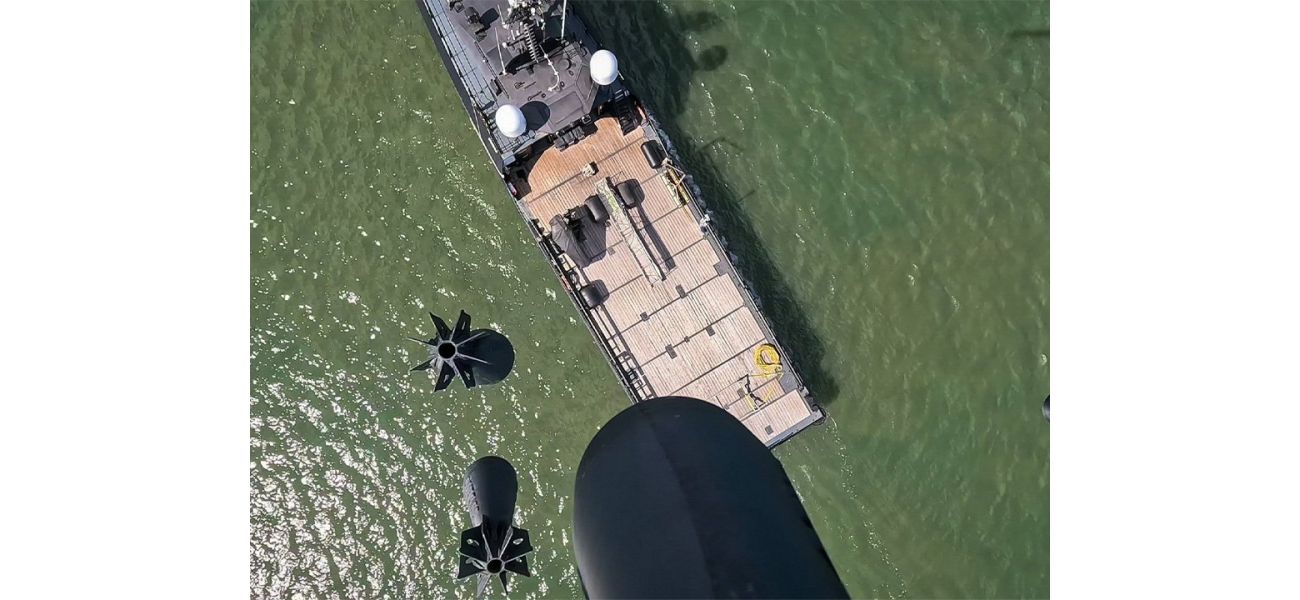Explosive drone used in war exercise targets £7 million warship.
The fleet launched many unmanned systems for combat.
September 26th 2024.

The XV Patrick Blackett, a state-of-the-art experimental ship owned by the Royal Navy, has recently made waves in the military world. It served as a testbed for cutting-edge technologies, constantly pushing the boundaries of what is possible at sea. However, its latest feat has captured the attention of the public.
In a daring demonstration of military prowess, a drone successfully dropped bombs on the XV Patrick Blackett, a vessel worth a staggering £7 million. This event took place in Portugal, as part of Nato's Digital Ocean Initiative, which saw 27 nations coming together to showcase their advancements in autonomous systems and military exercises.
The Royal Navy pulled out all the stops for this display, unleashing a variety of uncrewed systems, including hand-launched drones, surveillance drones, mini quadcopters, and Pacific 24 boats. The highlight of the show was the UAV Rotron drone, which was seen dropping artificial bombs on the ship, showcasing the latest in British warfare technology.
Nato, in a statement, explained that these wargames were a reflection of modern military tactics used at sea, citing the recent attacks on Russia's navy by Ukraine using uncrewed drone boats. The Alliance emphasized the importance of staying ahead of emerging threats and strengthening situational awareness through the use of disruptive technologies.
The Royal Navy, in response to Nato's call for technological advancements, deployed a range of drones and uncrewed vessels on the international exercise in Portugal. These included the Autonomous Pacific 24 ribs, hand-launched drones, mini quadcopters, and surveillance drones, all of which joined the XV Patrick Blackett for the annual uncrewed wargames.
Named REPMUS 24, these drills have been ongoing since September 9 and will continue until Friday. With personnel from 27 nations participating, the exercise has mostly focused on the use of uncrewed systems, with the goal of integrating them into operations and task groups. The Royal Navy remains committed to pushing the boundaries of what is possible at sea, constantly striving for technological superiority.
In a daring demonstration of military prowess, a drone successfully dropped bombs on the XV Patrick Blackett, a vessel worth a staggering £7 million. This event took place in Portugal, as part of Nato's Digital Ocean Initiative, which saw 27 nations coming together to showcase their advancements in autonomous systems and military exercises.
The Royal Navy pulled out all the stops for this display, unleashing a variety of uncrewed systems, including hand-launched drones, surveillance drones, mini quadcopters, and Pacific 24 boats. The highlight of the show was the UAV Rotron drone, which was seen dropping artificial bombs on the ship, showcasing the latest in British warfare technology.
Nato, in a statement, explained that these wargames were a reflection of modern military tactics used at sea, citing the recent attacks on Russia's navy by Ukraine using uncrewed drone boats. The Alliance emphasized the importance of staying ahead of emerging threats and strengthening situational awareness through the use of disruptive technologies.
The Royal Navy, in response to Nato's call for technological advancements, deployed a range of drones and uncrewed vessels on the international exercise in Portugal. These included the Autonomous Pacific 24 ribs, hand-launched drones, mini quadcopters, and surveillance drones, all of which joined the XV Patrick Blackett for the annual uncrewed wargames.
Named REPMUS 24, these drills have been ongoing since September 9 and will continue until Friday. With personnel from 27 nations participating, the exercise has mostly focused on the use of uncrewed systems, with the goal of integrating them into operations and task groups. The Royal Navy remains committed to pushing the boundaries of what is possible at sea, constantly striving for technological superiority.
[This article has been trending online recently and has been generated with AI. Your feed is customized.]
[Generative AI is experimental.]
0
0
Submit Comment





